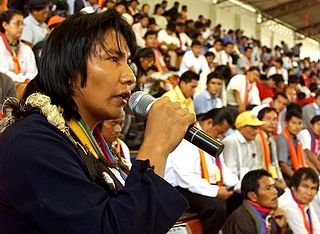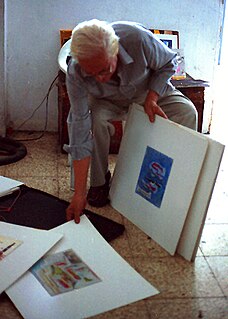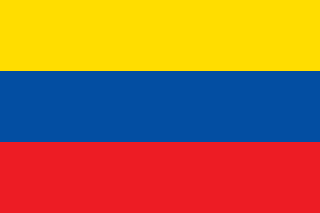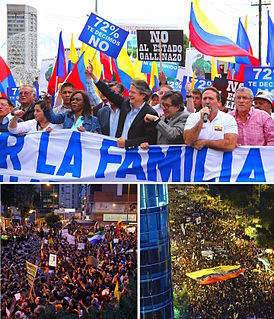Related Research Articles

Ecuador, officially the Republic of Ecuador, is a country in northwestern South America, bordered by Colombia on the north, Peru on the east and south, and the Pacific Ocean on the west. Ecuador also includes the Galápagos Islands in the Pacific, about 1,000 kilometers (621 mi) west of the mainland. The capital is Quito.
The History of Ecuador extends over an 8,000-year period. During this time, a variety of cultures and territories influenced what has become the Republic of Ecuador. The history can be divided into six eras: Pre-Columbian, the Conquest, the Colonial Period, the War of Independence, Gran Colombia and Simón Bolívar, and the final separation of his vision into what is known today as the Republic of Ecuador.

Quito, formally San Francisco de Quito, is the capital and most populous city of Ecuador, with an estimated population of 2.8 million in its urban area. It is also the capital of the province of Pichincha. Quito is located in a valley on the eastern slopes of Pichincha, an active stratovolcano in the Andes, at an elevation of 2,850 m (9,350 ft), making it the second-highest capital city in the world.

Guayaquil, officially Santiago de Guayaquil, is the second largest city in Ecuador and also the nation's main port. The city is the capital of Guayas Province and the seat of Guayaquil Canton.

The Confederation of Indigenous Nationalities of Ecuador or, more commonly, CONAIE, is Ecuador's largest Indigenous organization. Formed in 1986, CONAIE has pursued social change on behalf of the region's significant native population using a wide range of tactics, including direct action. CONAIE is most well known for its organization of popular uprisings that have been known to include blockading of commercial arteries and the seizure and occupation of government buildings.

The Ecuadorian–Peruvian territorial dispute was a territorial dispute between Ecuador and Peru, which, until 1928, also included Colombia. The dispute had its origins on each country's interpretation of what Real Cedulas Spain used to precisely define its colonial territories in the Americas. After independence, all of Spain's colonial territories signed and agreed to proclaim their limits in the basis of the principle of uti possidetis juris, which regarded the Spanish borders of 1810 as the borders of the new republics. However, conflicting claims and disagreements between the newly formed countries eventually escalated to the point of armed conflicts on several occasions.

The Ecuadorian Army is the land component of the Ecuadorian Armed Forces. Its 160,500 soldiers are deployed in relation to its military doctrine. The contemporary Ecuadorian Army incorporates many jungle and special forces infantry units into its structure.

Luis Enrique Tábara was a master Ecuadorian painter and teacher representing a whole Hispanic pictorial and artistic culture.
Aníbal Villacís was a master painter from Ecuador who used raw earthen materials such as clay and natural pigments to paint on walls and doors throughout his city when he could not afford expensive artist materials. As a teenager, Villacís taught himself drawing and composition by studying and recreating the illustrated ad posters for bullfights in Quito. In 1952, Jose Maria Velasco Ibarra, former President of Ecuador, discovered Villacís and offered him a scholarship to study in Paris.

When it comes to religion, the Ecuadorian society is relatively homogeneous, with Christianity being the primary religion. Roman Catholicism is the main Christian denomination in the country. However, affiliation with Protestant churches is increasing.

The Politecnica Salesiana University in Ecuador is an institution of higher education and Christian inspiration with Catholic character and a Salesian. The university is characterized by its opportunities for youth, especially from the poor sectors.

Enrique Gil Gilbert was an Ecuadorian novelist, journalist, poet, and a high-ranking member of the Communist Party of Ecuador.

The history of the Republic of Ecuador from 1830 to 1860 begins with the collapse of the nation of Gran Colombia in 1830, followed by the assassination of Antonio José de Sucre and the death of Simón Bolívar from tuberculosis the same year. Heartbroken at the dissolution of Gran Colombia, Bolívar is quoted to have said shortly before his death, "America is ungovernable. Those who have served the revolution have plowed the sea." These words would seem prophetic during the chaotic first thirty years in the existence of Ecuador.

Violeta Luna is an Ecuadorian poet, essayist, professor and literary critic.
Frente Único de Lucha Campesina (FULC) was a coalition of popular movements in Ecuador, formed to campaign for the abolishment of Ley de Fomento Agropecuario and Ley de Seguridad Nacional, as well as demanding effective implementation of land reform. FULC consisted of FENOC, FEI and ECUARUNARI. FULC was founded on April 8, 1978, at a joint congress of the three organizations in Columbe.

Rafael Díaz Ycaza was an Ecuadorian poet, novelist, short story writer, and columnist for the Ecuadorian newspaper El Universo.

Carmen Acevedo Vega was an Ecuadorian poet, writer, and journalist.

The 2015 Ecuadorian protests were a series of protests against the inheritance tax laws introduced by Ecuadorian President Rafael Correa. The protests began during the first week of June; becoming more organized and growing to hundreds of people on 8 June 2015. Since then, hundreds of thousands of Ecuadorians protested throughout Ecuador against President Correa and the controversial inheritance tax laws he introduced. The opposition and demonstrators protested stating that Correa wanted to follow "the same path as Venezuela’s government", creating a "criminal war of classes" while President Correa stated that the protests were aimed at destabilizing the government and such measures were for combatting inequality.
The 2020 Supercopa Ecuador was the first edition of the Supercopa Ecuador, Ecuador's football super cup. It was held on 1 February 2020 between 2019 Ecuadorian Serie A champions Delfín and 2019 Copa Ecuador champions LDU Quito, being the third final in a row played between both sides after the final series of both the league and the cup. It was also the first time VAR was implemented in Ecuadorian football.

The COVID-19 pandemic in Ecuador is part of the worldwide pandemic of coronavirus disease 2019 caused by severe acute respiratory syndrome coronavirus 2. The virus was reported to have spread to Ecuador on 29 February 2020, when a woman in her 70s tested positive for the virus. Ecuador was described in April as emerging as a possible "epicentre" of the pandemic in Latin America, with the city of Guayaquil overwhelmed to the point where bodies were being left in the street.
References
- 1 2 3 4 Becker, Marc. Indians and Leftists in the Making of Ecuador's Modern Indigenous Movements . Durham: Duke University Press, 2008. p. 162
- ↑ Navarrete, Edwin. FENOCIN Hacia el nuevo milenio: Porque en el campo está la fuerza del desarrollo, de la identidad y la vida . Quito, Ecuador: Federacion Nacional de Organizaciones Campecinas, Indigenas y Negras, 1999. p. 63
- ↑ "Archived copy" (PDF). Archived from the original (PDF) on 2011-07-27. Retrieved 2011-03-15.
{{cite web}}: CS1 maint: archived copy as title (link)